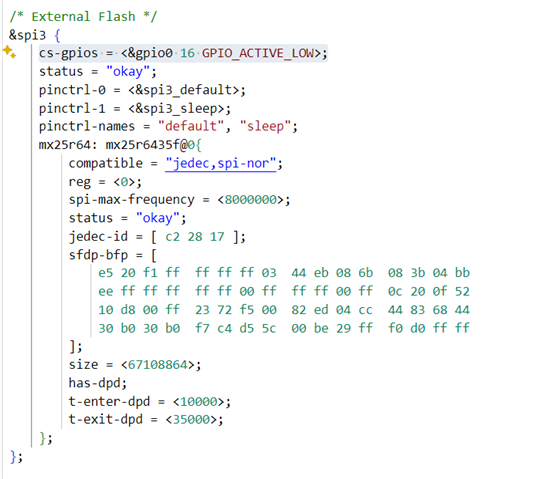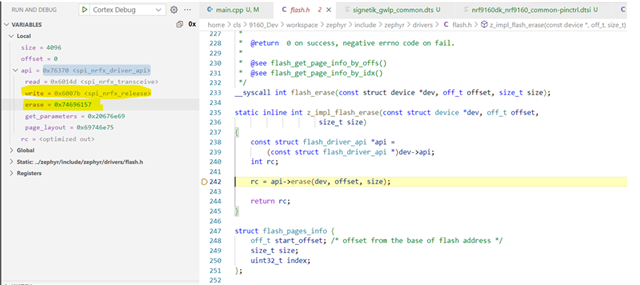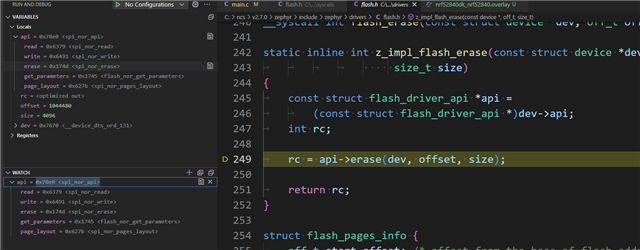I am using MX25 external flash with nRF9160. I am unable to find the configuration to use the Zephyr APIs to access the flash. I am able to access it when I am using
I am using MX25 external flash with nRF9160. I am unable to find the configuration to use the Zephyr APIs to access the flash. I am able to access it when I am using
Hi
You might want to look at Zephyr Flash sample that demonstrates the use of flash API:
I have checked this example but it didn't worked for me. When I was calling the flash_erase I was getting some wierd observation.
This functions calls the following code:
I am using the following to the flash device from DT:

My Device Tree:
what error you are getting now?
defining aliases for instances is fine.
you can do the debugging to see what is causing the issue.

. You can see in the above image when I execute line 242, I am getting exceptions and that could be because of the erase is not pointing to any valid function (as seen in watch)
Hi Amit,
I have tested on nrf52840dk, and I do not get any problem

I can see the correct functionality as well.
Just for reference, I am putting the nrf52840DK overlay here which is based on your overlay, the sample output dts, and the information from the DK guide.
/delete-node/ &mx25r64;
&qspi{
status = "disabled";
};
&spi3{
compatible = "nordic,nrf-spim";
status = "okay";
pinctrl-0 = < &spi3_default >;
pinctrl-1 = < &spi3_sleep >;
pinctrl-names = "default", "sleep";
cs-gpios = <&gpio0 17 GPIO_ACTIVE_LOW>; /* D10 */
mx25r64: mx25r6435f@0 {
compatible = "jedec,spi-nor";
reg = < 0x0 >;
spi-max-frequency = < 8000000 >;
status = "okay";
jedec-id = [ C2 28 17 ];
sfdp-bfp = [ E5 20 F1 FF FF FF FF 03 44 EB 08 6B 08 3B 04 BB EE FF FF FF FF FF 00 FF FF FF 00 FF 0C 20 0F 52 10 D8 00 FF 23 72 F5 00 82 ED 04 CC 44 83 68 44 30 B0 30 B0 F7 C4 D5 5C 00 BE 29 FF F0 D0 FF FF ];
size = < 0x4000000 >;
has-dpd;
t-enter-dpd = < 0x2710 >;
t-exit-dpd = < 0x88b8 >;
};
};
&pinctrl{
spi3_default: spi3_default {
group1 {
psels = <NRF_PSEL(SPIM_SCK, 0, 19)>,
<NRF_PSEL(SPIM_MISO, 0, 21)>,
<NRF_PSEL(SPIM_MOSI, 0, 20)>;
};
};
spi3_sleep: spi3_sleep {
group1 {
psels = <NRF_PSEL(SPIM_SCK, 0, 19)>,
<NRF_PSEL(SPIM_MISO, 0, 21)>,
<NRF_PSEL(SPIM_MOSI, 0, 20)>;
low-power-enable;
};
};
};
/{
aliases{
spi-flash0 = &mx25r64;
};
};
I am using the exact sample without modifying anything in the main except including a header file for the spi.
In the project configurations, SPI is enabled and QSPI is disabled; similarly in the overlay.
Hi Amit,
I have tested on nrf52840dk, and I do not get any problem

I can see the correct functionality as well.
Just for reference, I am putting the nrf52840DK overlay here which is based on your overlay, the sample output dts, and the information from the DK guide.
/delete-node/ &mx25r64;
&qspi{
status = "disabled";
};
&spi3{
compatible = "nordic,nrf-spim";
status = "okay";
pinctrl-0 = < &spi3_default >;
pinctrl-1 = < &spi3_sleep >;
pinctrl-names = "default", "sleep";
cs-gpios = <&gpio0 17 GPIO_ACTIVE_LOW>; /* D10 */
mx25r64: mx25r6435f@0 {
compatible = "jedec,spi-nor";
reg = < 0x0 >;
spi-max-frequency = < 8000000 >;
status = "okay";
jedec-id = [ C2 28 17 ];
sfdp-bfp = [ E5 20 F1 FF FF FF FF 03 44 EB 08 6B 08 3B 04 BB EE FF FF FF FF FF 00 FF FF FF 00 FF 0C 20 0F 52 10 D8 00 FF 23 72 F5 00 82 ED 04 CC 44 83 68 44 30 B0 30 B0 F7 C4 D5 5C 00 BE 29 FF F0 D0 FF FF ];
size = < 0x4000000 >;
has-dpd;
t-enter-dpd = < 0x2710 >;
t-exit-dpd = < 0x88b8 >;
};
};
&pinctrl{
spi3_default: spi3_default {
group1 {
psels = <NRF_PSEL(SPIM_SCK, 0, 19)>,
<NRF_PSEL(SPIM_MISO, 0, 21)>,
<NRF_PSEL(SPIM_MOSI, 0, 20)>;
};
};
spi3_sleep: spi3_sleep {
group1 {
psels = <NRF_PSEL(SPIM_SCK, 0, 19)>,
<NRF_PSEL(SPIM_MISO, 0, 21)>,
<NRF_PSEL(SPIM_MOSI, 0, 20)>;
low-power-enable;
};
};
};
/{
aliases{
spi-flash0 = &mx25r64;
};
};
I am using the exact sample without modifying anything in the main except including a header file for the spi.
In the project configurations, SPI is enabled and QSPI is disabled; similarly in the overlay.